Queensland Zombie Outbreak 2019: Legal, Ethical Duties of Nurses
VerifiedAdded on 2023/06/03
|5
|1153
|387
Case Study
AI Summary
This case study analyzes the legal and ethical considerations for nurses during a hypothetical zombie outbreak in Queensland, February 2019. It explores the ethical dilemmas concerning resource allocation, the right to life, and the responsibilities of healthcare providers in such a crisis. Legally, the study examines the duty of care, professional standards, and the potential conflicts between a nurse's obligations to self, family, patients, and employer. It references Australian and American legal frameworks, highlighting the absence of specific guidelines for emergency epidemic scenarios. The analysis touches on the law of contract, potential negligence charges, and the applicability of Good Samaritan laws, concluding that the legal and ethical landscape surrounding zombie outbreak control is ambiguous, leaving nurses in a precarious position where actions may be subject to both civil and criminal prosecution.
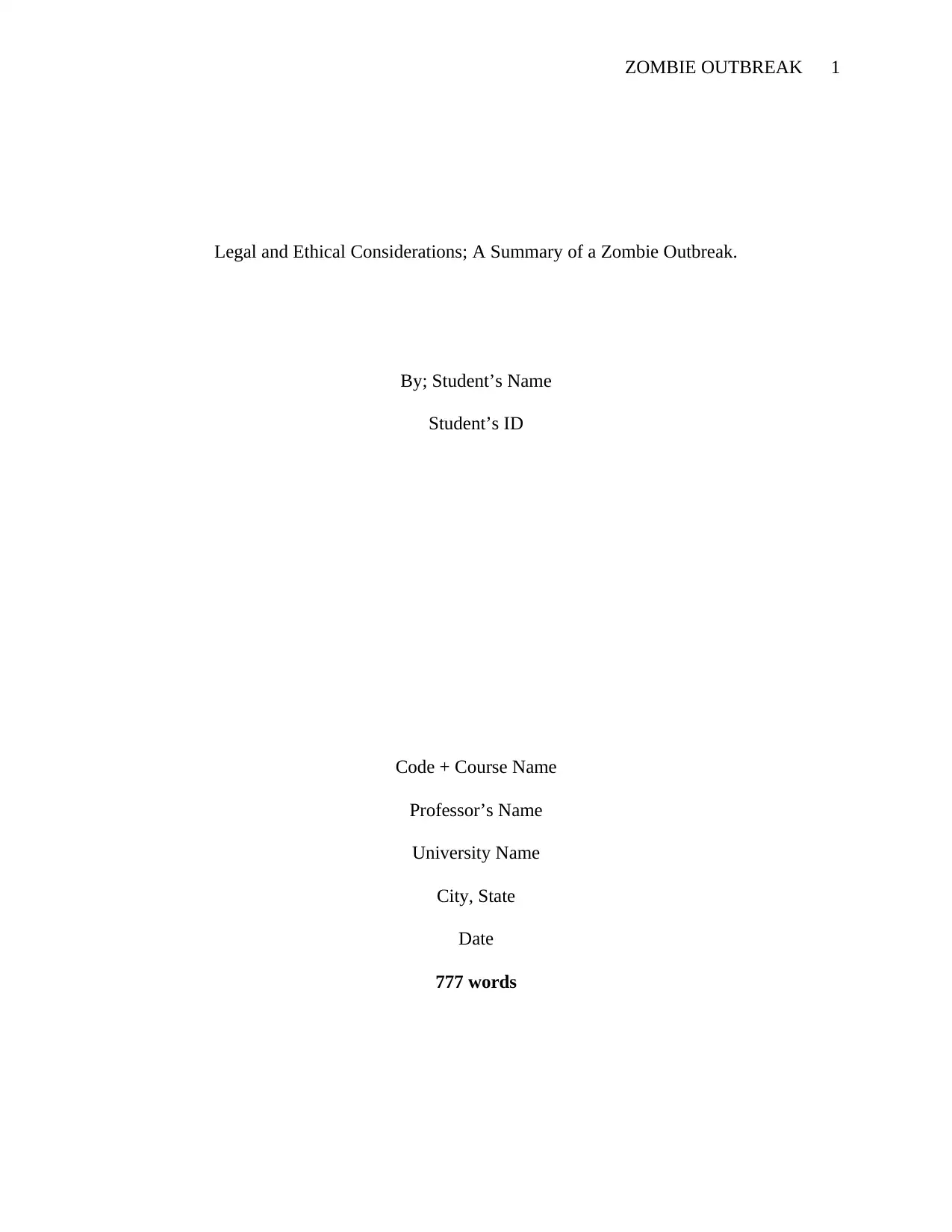
ZOMBIE OUTBREAK 1
Legal and Ethical Considerations; A Summary of a Zombie Outbreak.
By; Student’s Name
Student’s ID
Code + Course Name
Professor’s Name
University Name
City, State
Date
777 words
Legal and Ethical Considerations; A Summary of a Zombie Outbreak.
By; Student’s Name
Student’s ID
Code + Course Name
Professor’s Name
University Name
City, State
Date
777 words
Paraphrase This Document
Need a fresh take? Get an instant paraphrase of this document with our AI Paraphraser
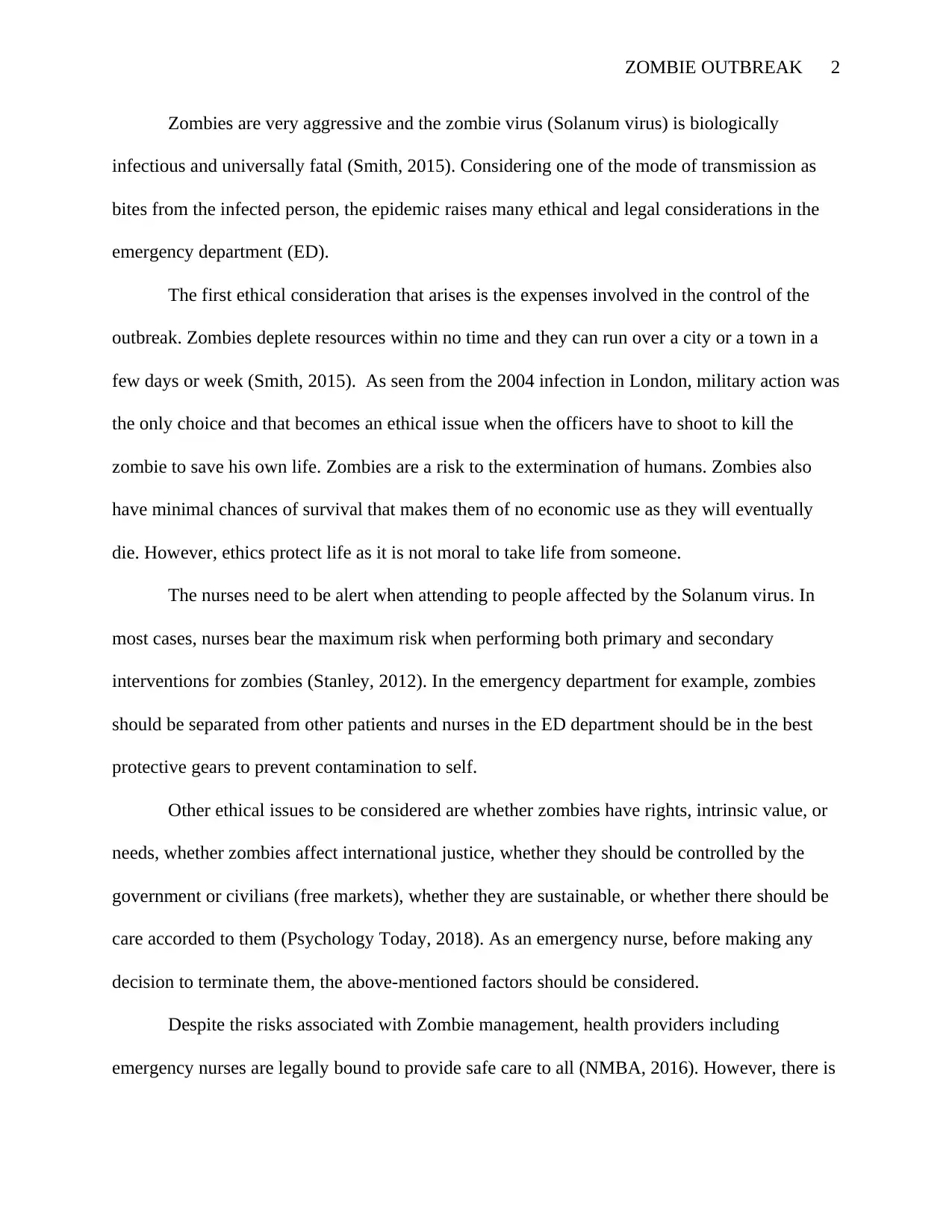
ZOMBIE OUTBREAK 2
Zombies are very aggressive and the zombie virus (Solanum virus) is biologically
infectious and universally fatal (Smith, 2015). Considering one of the mode of transmission as
bites from the infected person, the epidemic raises many ethical and legal considerations in the
emergency department (ED).
The first ethical consideration that arises is the expenses involved in the control of the
outbreak. Zombies deplete resources within no time and they can run over a city or a town in a
few days or week (Smith, 2015). As seen from the 2004 infection in London, military action was
the only choice and that becomes an ethical issue when the officers have to shoot to kill the
zombie to save his own life. Zombies are a risk to the extermination of humans. Zombies also
have minimal chances of survival that makes them of no economic use as they will eventually
die. However, ethics protect life as it is not moral to take life from someone.
The nurses need to be alert when attending to people affected by the Solanum virus. In
most cases, nurses bear the maximum risk when performing both primary and secondary
interventions for zombies (Stanley, 2012). In the emergency department for example, zombies
should be separated from other patients and nurses in the ED department should be in the best
protective gears to prevent contamination to self.
Other ethical issues to be considered are whether zombies have rights, intrinsic value, or
needs, whether zombies affect international justice, whether they should be controlled by the
government or civilians (free markets), whether they are sustainable, or whether there should be
care accorded to them (Psychology Today, 2018). As an emergency nurse, before making any
decision to terminate them, the above-mentioned factors should be considered.
Despite the risks associated with Zombie management, health providers including
emergency nurses are legally bound to provide safe care to all (NMBA, 2016). However, there is
Zombies are very aggressive and the zombie virus (Solanum virus) is biologically
infectious and universally fatal (Smith, 2015). Considering one of the mode of transmission as
bites from the infected person, the epidemic raises many ethical and legal considerations in the
emergency department (ED).
The first ethical consideration that arises is the expenses involved in the control of the
outbreak. Zombies deplete resources within no time and they can run over a city or a town in a
few days or week (Smith, 2015). As seen from the 2004 infection in London, military action was
the only choice and that becomes an ethical issue when the officers have to shoot to kill the
zombie to save his own life. Zombies are a risk to the extermination of humans. Zombies also
have minimal chances of survival that makes them of no economic use as they will eventually
die. However, ethics protect life as it is not moral to take life from someone.
The nurses need to be alert when attending to people affected by the Solanum virus. In
most cases, nurses bear the maximum risk when performing both primary and secondary
interventions for zombies (Stanley, 2012). In the emergency department for example, zombies
should be separated from other patients and nurses in the ED department should be in the best
protective gears to prevent contamination to self.
Other ethical issues to be considered are whether zombies have rights, intrinsic value, or
needs, whether zombies affect international justice, whether they should be controlled by the
government or civilians (free markets), whether they are sustainable, or whether there should be
care accorded to them (Psychology Today, 2018). As an emergency nurse, before making any
decision to terminate them, the above-mentioned factors should be considered.
Despite the risks associated with Zombie management, health providers including
emergency nurses are legally bound to provide safe care to all (NMBA, 2016). However, there is
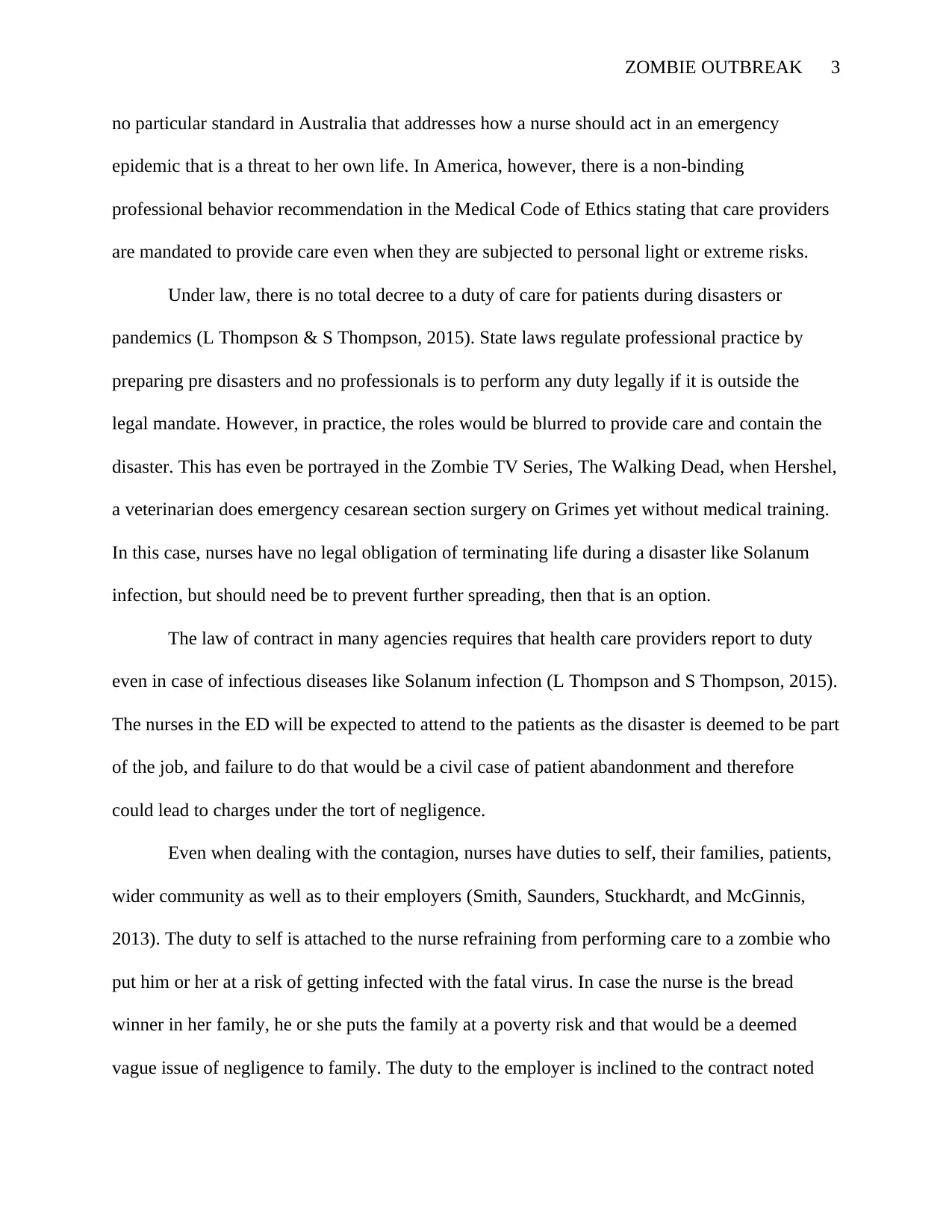
ZOMBIE OUTBREAK 3
no particular standard in Australia that addresses how a nurse should act in an emergency
epidemic that is a threat to her own life. In America, however, there is a non-binding
professional behavior recommendation in the Medical Code of Ethics stating that care providers
are mandated to provide care even when they are subjected to personal light or extreme risks.
Under law, there is no total decree to a duty of care for patients during disasters or
pandemics (L Thompson & S Thompson, 2015). State laws regulate professional practice by
preparing pre disasters and no professionals is to perform any duty legally if it is outside the
legal mandate. However, in practice, the roles would be blurred to provide care and contain the
disaster. This has even be portrayed in the Zombie TV Series, The Walking Dead, when Hershel,
a veterinarian does emergency cesarean section surgery on Grimes yet without medical training.
In this case, nurses have no legal obligation of terminating life during a disaster like Solanum
infection, but should need be to prevent further spreading, then that is an option.
The law of contract in many agencies requires that health care providers report to duty
even in case of infectious diseases like Solanum infection (L Thompson and S Thompson, 2015).
The nurses in the ED will be expected to attend to the patients as the disaster is deemed to be part
of the job, and failure to do that would be a civil case of patient abandonment and therefore
could lead to charges under the tort of negligence.
Even when dealing with the contagion, nurses have duties to self, their families, patients,
wider community as well as to their employers (Smith, Saunders, Stuckhardt, and McGinnis,
2013). The duty to self is attached to the nurse refraining from performing care to a zombie who
put him or her at a risk of getting infected with the fatal virus. In case the nurse is the bread
winner in her family, he or she puts the family at a poverty risk and that would be a deemed
vague issue of negligence to family. The duty to the employer is inclined to the contract noted
no particular standard in Australia that addresses how a nurse should act in an emergency
epidemic that is a threat to her own life. In America, however, there is a non-binding
professional behavior recommendation in the Medical Code of Ethics stating that care providers
are mandated to provide care even when they are subjected to personal light or extreme risks.
Under law, there is no total decree to a duty of care for patients during disasters or
pandemics (L Thompson & S Thompson, 2015). State laws regulate professional practice by
preparing pre disasters and no professionals is to perform any duty legally if it is outside the
legal mandate. However, in practice, the roles would be blurred to provide care and contain the
disaster. This has even be portrayed in the Zombie TV Series, The Walking Dead, when Hershel,
a veterinarian does emergency cesarean section surgery on Grimes yet without medical training.
In this case, nurses have no legal obligation of terminating life during a disaster like Solanum
infection, but should need be to prevent further spreading, then that is an option.
The law of contract in many agencies requires that health care providers report to duty
even in case of infectious diseases like Solanum infection (L Thompson and S Thompson, 2015).
The nurses in the ED will be expected to attend to the patients as the disaster is deemed to be part
of the job, and failure to do that would be a civil case of patient abandonment and therefore
could lead to charges under the tort of negligence.
Even when dealing with the contagion, nurses have duties to self, their families, patients,
wider community as well as to their employers (Smith, Saunders, Stuckhardt, and McGinnis,
2013). The duty to self is attached to the nurse refraining from performing care to a zombie who
put him or her at a risk of getting infected with the fatal virus. In case the nurse is the bread
winner in her family, he or she puts the family at a poverty risk and that would be a deemed
vague issue of negligence to family. The duty to the employer is inclined to the contract noted
⊘ This is a preview!⊘
Do you want full access?
Subscribe today to unlock all pages.

Trusted by 1+ million students worldwide
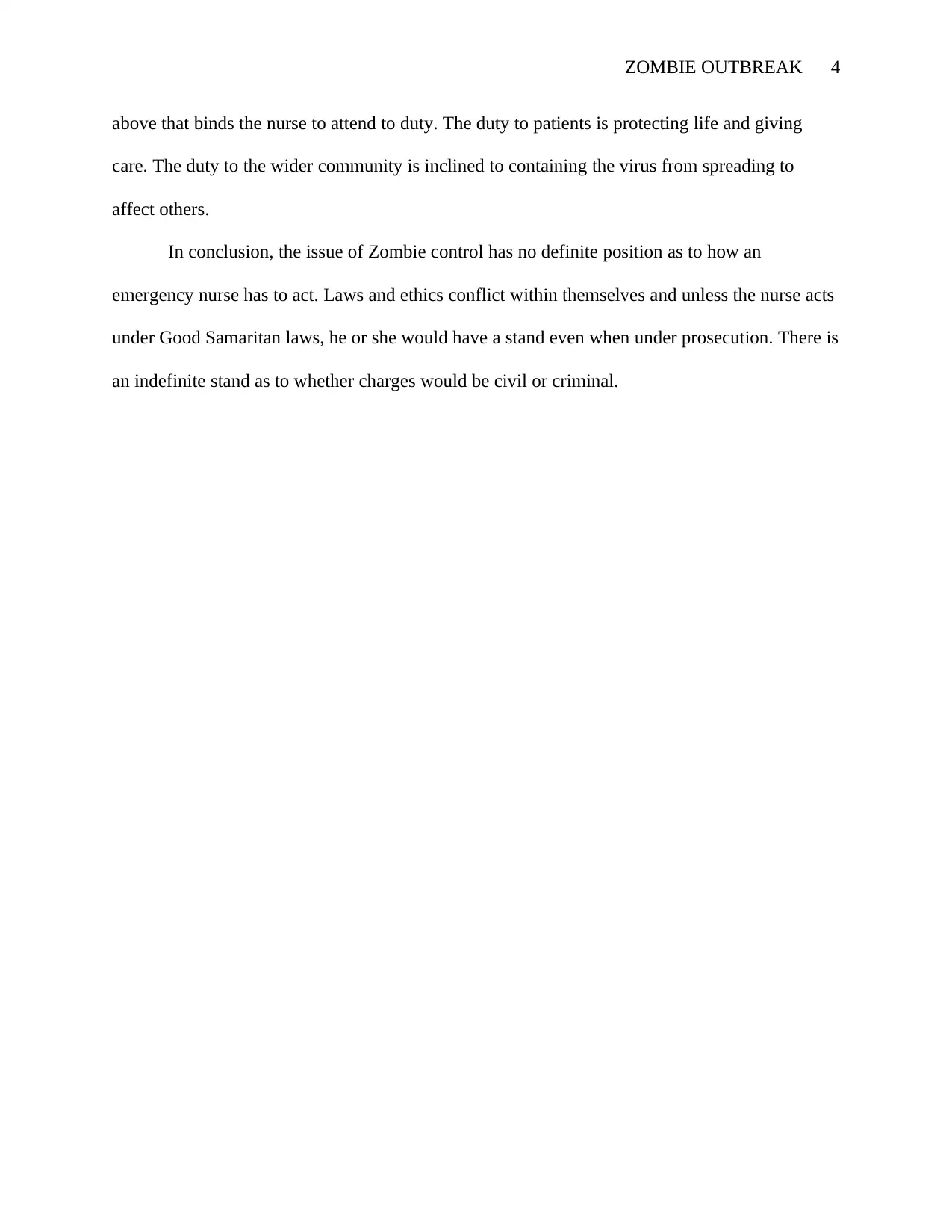
ZOMBIE OUTBREAK 4
above that binds the nurse to attend to duty. The duty to patients is protecting life and giving
care. The duty to the wider community is inclined to containing the virus from spreading to
affect others.
In conclusion, the issue of Zombie control has no definite position as to how an
emergency nurse has to act. Laws and ethics conflict within themselves and unless the nurse acts
under Good Samaritan laws, he or she would have a stand even when under prosecution. There is
an indefinite stand as to whether charges would be civil or criminal.
above that binds the nurse to attend to duty. The duty to patients is protecting life and giving
care. The duty to the wider community is inclined to containing the virus from spreading to
affect others.
In conclusion, the issue of Zombie control has no definite position as to how an
emergency nurse has to act. Laws and ethics conflict within themselves and unless the nurse acts
under Good Samaritan laws, he or she would have a stand even when under prosecution. There is
an indefinite stand as to whether charges would be civil or criminal.
Paraphrase This Document
Need a fresh take? Get an instant paraphrase of this document with our AI Paraphraser
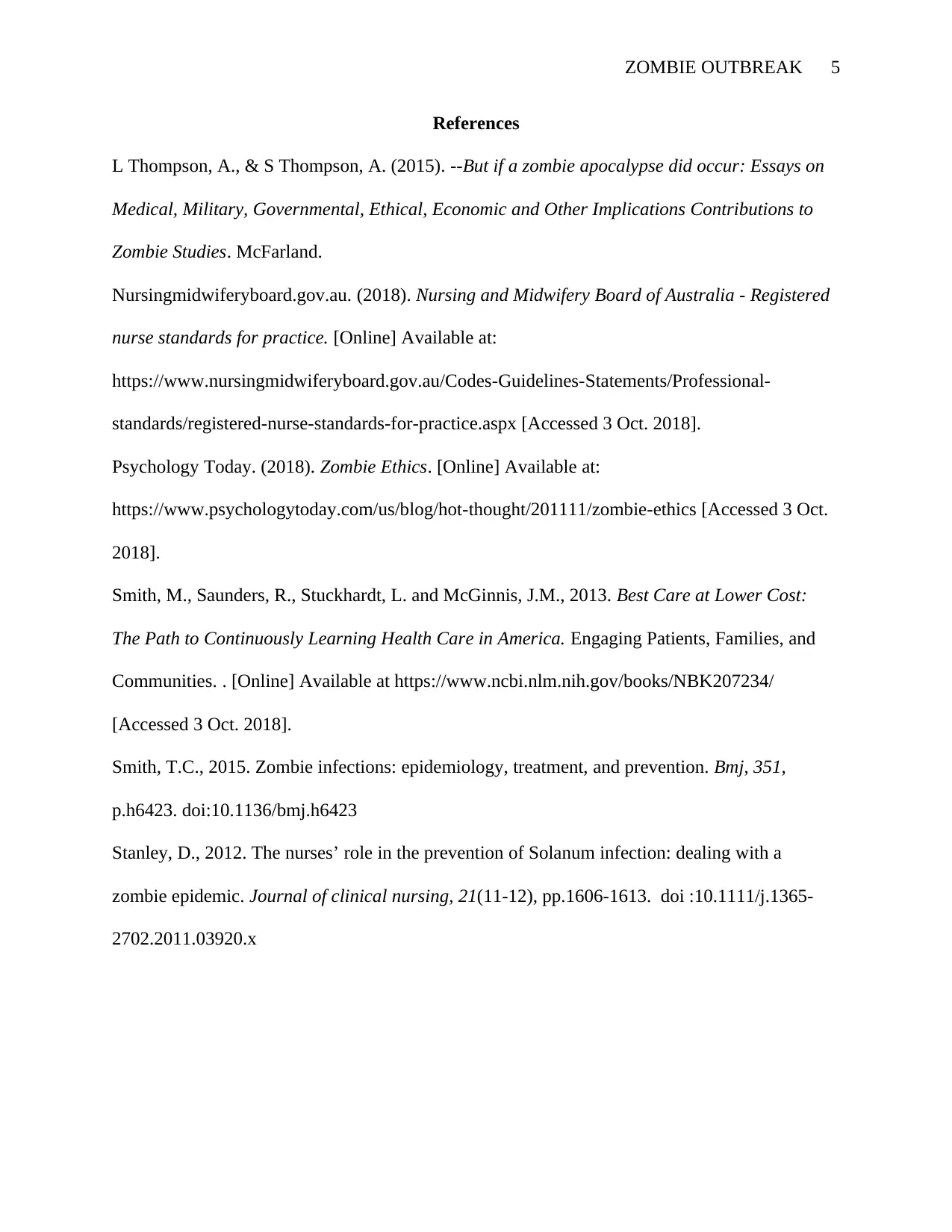
ZOMBIE OUTBREAK 5
References
L Thompson, A., & S Thompson, A. (2015). --But if a zombie apocalypse did occur: Essays on
Medical, Military, Governmental, Ethical, Economic and Other Implications Contributions to
Zombie Studies. McFarland.
Nursingmidwiferyboard.gov.au. (2018). Nursing and Midwifery Board of Australia - Registered
nurse standards for practice. [Online] Available at:
https://www.nursingmidwiferyboard.gov.au/Codes-Guidelines-Statements/Professional-
standards/registered-nurse-standards-for-practice.aspx [Accessed 3 Oct. 2018].
Psychology Today. (2018). Zombie Ethics. [Online] Available at:
https://www.psychologytoday.com/us/blog/hot-thought/201111/zombie-ethics [Accessed 3 Oct.
2018].
Smith, M., Saunders, R., Stuckhardt, L. and McGinnis, J.M., 2013. Best Care at Lower Cost:
The Path to Continuously Learning Health Care in America. Engaging Patients, Families, and
Communities. . [Online] Available at https://www.ncbi.nlm.nih.gov/books/NBK207234/
[Accessed 3 Oct. 2018].
Smith, T.C., 2015. Zombie infections: epidemiology, treatment, and prevention. Bmj, 351,
p.h6423. doi:10.1136/bmj.h6423
Stanley, D., 2012. The nurses’ role in the prevention of Solanum infection: dealing with a
zombie epidemic. Journal of clinical nursing, 21(11‐12), pp.1606-1613. doi :10.1111/j.1365-
2702.2011.03920.x
References
L Thompson, A., & S Thompson, A. (2015). --But if a zombie apocalypse did occur: Essays on
Medical, Military, Governmental, Ethical, Economic and Other Implications Contributions to
Zombie Studies. McFarland.
Nursingmidwiferyboard.gov.au. (2018). Nursing and Midwifery Board of Australia - Registered
nurse standards for practice. [Online] Available at:
https://www.nursingmidwiferyboard.gov.au/Codes-Guidelines-Statements/Professional-
standards/registered-nurse-standards-for-practice.aspx [Accessed 3 Oct. 2018].
Psychology Today. (2018). Zombie Ethics. [Online] Available at:
https://www.psychologytoday.com/us/blog/hot-thought/201111/zombie-ethics [Accessed 3 Oct.
2018].
Smith, M., Saunders, R., Stuckhardt, L. and McGinnis, J.M., 2013. Best Care at Lower Cost:
The Path to Continuously Learning Health Care in America. Engaging Patients, Families, and
Communities. . [Online] Available at https://www.ncbi.nlm.nih.gov/books/NBK207234/
[Accessed 3 Oct. 2018].
Smith, T.C., 2015. Zombie infections: epidemiology, treatment, and prevention. Bmj, 351,
p.h6423. doi:10.1136/bmj.h6423
Stanley, D., 2012. The nurses’ role in the prevention of Solanum infection: dealing with a
zombie epidemic. Journal of clinical nursing, 21(11‐12), pp.1606-1613. doi :10.1111/j.1365-
2702.2011.03920.x
1 out of 5
Related Documents
Your All-in-One AI-Powered Toolkit for Academic Success.
+13062052269
info@desklib.com
Available 24*7 on WhatsApp / Email
![[object Object]](/_next/static/media/star-bottom.7253800d.svg)
Unlock your academic potential
Copyright © 2020–2025 A2Z Services. All Rights Reserved. Developed and managed by ZUCOL.





